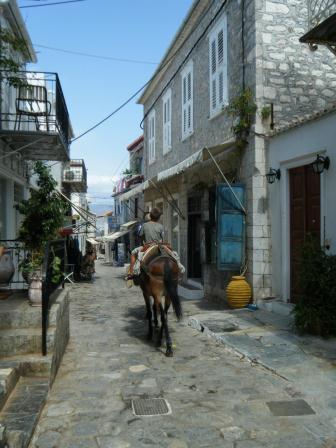Hydra Summer School in Stem Cells and Regenerative Medicine
Posted by sjd, on 8 October 2012
The Hydra Summer School presents a unique opportunity to young scientists in the field of stem cell research to engage with leading experts and peers alike. Set on an idyllic Greek island, where you’re more likely to encounter the wrong side of a donkey than a bicycle or car, an intensive week-long programme of lectures, discussions, debate and discourse unfolds. The programme spans the fundamental paradigms that underlie stem cell systems through to the state-of-the-art in clinical practice, and covers the breadth of stem cell research in-between.
In relating my experience of the summer school, it is necessary to divulge my dirty secret: I’m not a biologist. My undergraduate degree was in Mathematics, and my Phd undertaken within a Computer Science department in a group that comprised physicists, engineers, computer scientists and mathematicians, all carrying out cross-disciplinary research in computational modelling of biological systems. Worldwide, we are an expanding group, and engagement with biologists is key to the success and value of the research we perform. Without formal biological training, it is vital for physical scientists to absorb information from biologists directly – it is quite difficult to have a conversation with a book, bordering dangerous to do so on the internet, and we are simply unarmed when it comes to discerning the quality of new biological research and publications. It is with this motivation that I set off to Hydra.
The breadth of research covered by the lectures was excellent, allowing the attendees to engage both in new topics as well as with their own specialisation. Some of the most interesting lectures illustrated the application of stem cell research in understanding disease onset and progression, as more often than not the focus can be on the fully developed disease itself, rather than understanding what is stable under normal, healthy conditions. By understanding a healthy system fully, only then can we isolate the aberrant changes, and discern how best to implement stem cell therapies.
Personally, I particularly enjoyed the recurring discussion on the definition of a stem cell, and how one must be aware of the language subtleties that exist between different researchers and sub-disciplines. Is a fertilised egg a stem cell? Perhaps, if you’re a developmental biologist. Relevant in this context is the concept of asymmetric division, which we were challenged to think more deeply about. Despite what may seem, there is little empirical evidence to support different models of division through lineage progression. Moreover, for asymmetric division to occur, at which point is the decision made by the cell? Is it intrinsic, and thereby a consequence of mitosis itself, or is it extrinsic, and thereby dependent on the extracellular environment into which one daughter cell is placed?
Supplementing the lecture topics were discussion sessions with the individuals PIs, a rare opportunity to engage with these scientists in a small group setting. The discussions that I participated in were accompanied by recent and not-so-recent-but-important papers, chosen by the discussion leader. I found it particularly useful to engage with biologists over these papers, to understand how a biologist reads a paper, and to learn a little more about how to be discerning in your reading. Another very useful supplement to the lectures was a session entitled, “Communicake!” (Regretful disclaimer: no cake was provided.) This was a session in which participants reviewed specific lectures in small groups, and in tandem with the lecturer themselves, drew up a list of the key points that were conveyed in the talk, and had a further opportunity to ask the lecturer more questions. I confess this gave me the opportunity to ask a couple of my more “stupid questions”, but it was extremely helpful to have focused discussion on specific lectures, and I am now a big advocate of review sessions such as these.
On top of this, as an on-going feature of the week, were the posters brought by all participants on their own research. Again, this provided the opportunity for interesting discussions, the odd stupid question, and for me personally, the chance to really engage with the research being conducted on a day to day basis by my peers. The poster prizes themselves were awarded deservingly (don’t worry, not by me – I made it safely into the “also-ran” category).
I am very grateful that I was given the opportunity to attend the Hydra Summer School, and am happy to give a brief report which gives a glimpse into the usefulness and breadth of the experience. So without hesitation, be you biologist, mathematician, physicist or engineer, I encourage you to apply for this opportunity if you are working in stem cell research. In the very least, you’ll like the donkeys.




 (5 votes)
(5 votes)